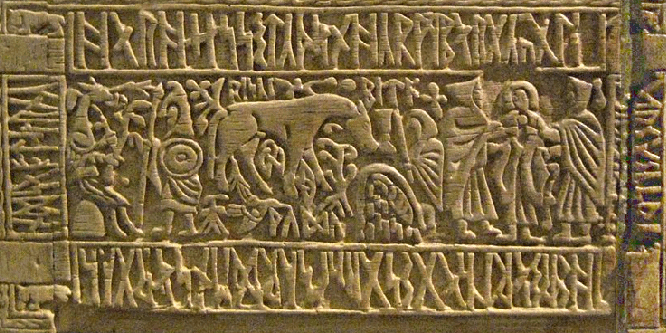4. Fascism can mean the Hope for better Law and Order
When Caesar entered the kingdom of Egypt, lictors
accompanied him wearing the fasces. It was the tradition in ancient
Rome that some bailiffs would accompany such a high-ranking
politician. Caesar was a dictator, who in a time of national
emergency was supposed to support the ordinary elected authorities.
The fasces were rods for flogging, bundled around a hatchet. Many
Egyptians were enraged when they saw the fasces. For them it looked
like Caesar menaced to punish them. At that time Egypt was still an
independent kingdom. Soon hostilities erupted against the Roman
troops. But the interior situation in Egypt was rather chaotic. There
were four under-age princes and princesses, the game figures in a
feud over the throne. In Alexandria but a gang of renegades, and
outlaws from abroad, ruled that kingdom. Achillas, their warlord, and
others must have been of Greek descent. Due to their better genes and
their unscrupulous ways they were just tougher than the dark-skinned
native Egyptians. These gangsters would welcome refugees from Rome or
the Mediterranean who had been outlawed by Rome due to bad deeds.
With his usual fervour and luck Caesar made an end to this rule of
the foreign rogues and mercenaries. Here the fasces also symbolized
the rule of justice, that only some better Europeans could bring to
such places. It was much the same in Gaul and Britain. From Britain
the druids and nobles had ruled the entire Celtic region with
violence and arbitrariness. Germanic invaders and refugees were
troubling Gaul like wolves. Even the Celtic gods seemed to be more
evil than elsewhere, demanding so many cruel human sacrifices! Caesar
interfered with abominable deeds of genocide, eventually killing many
thousands of people. But his success was also due to the support that
the commons gave him, who were much suppressed by the rule of
violence and arbitrariness of the priests and the nobles. All Gaul
and Britain must have been glad that Caesar seemed to break the evil
rule of the Celtic gods. Maybe trusting in Venus, the mother goddess
of his clan, that rather ignoble man just dared this. In his young
years Caesar had seen how the state of Rome had become the booty of
feuding clans and parties. The noble Patricians under Sulla had won a
civil war against the party of the common Plebeians. Caesar had been
outlawed as a Plebeian, and that made him lose his trust into the
older institutions and traditions of the republican government. He
was a revolutionary, and like rebels often do he thought of himself
as the wiser guy, who deserved to be in charge of most everything.
Sueton (9) wrote up a very mysterious story from the
younger era of Caesar. As a young career politician Caesar already
had plotted with Gn. Piso, to topple the tyrannical rule of the
Patricians and become a big man in Rome. Already some Gaulish, who at
that time lived in upper Italy too, north of the river Po, had been
his conspirators. But we also read of a mysterious foreign people
that backed him: the Ambranos. Historians know of no such people.
Some speculate that these must have been descendants of the Ambrones.
That was a people of the Teutonic hordes, who had tried in vain to
invade Italy. It sounds likely that some of these later settled down
in upper Italy. Their name links not only to the island of Amrum, but
even more to the word amber. Surely the Italian fascists of that era
also realized that there is a strange divine magic with those really
coloured people, if we correctly interpret this word as Whites having
natural colours. If we think that Ambranos means people with amber to
brown hair, then this is just how the truly Celtic of the Alpine
region originally looked like. Only in Britain, due to local magic,
they much darkened.
Today many leftists and others strongly oppose
fascism, since this seems to be the rule of roguish, tyrannical
right-wingers. Historically though fascism was a counter-measure
against political and economical crises. Often liberal and democratic
governments would become over-aged, egoistic and incompetent.
Eventually bad oligarchs would become more and more powerful, while
the commons would lose their assets and civil liberties. The hope of
many simple people was it then that one of them would become powerful
enough to bring law and order to the state, with the help of good
magic and good gods. The Latin word fas means divine good law.
It's related to sorcery. The idea of fascism is that a good order
would bring divine justice to a people. In theory the beautiful
people, those with golden hair, would appear to be some more in the
favour of destiny. The UTR has it that the colour amber is the hair
colour of real angels, the gods of the 666 earths of the Humanoids.
That accords to the mostly golden-haired angels on church paintings.
The rebellion of Gnaius Piso ended early, when
Hispanic riders killed him. That was only one of many unsuccessful
coup attempts in which Caesar played a part. He also was involved in
the odd coup attempts of Catilina, and later tried to defend that
rogue. If he hadn't been so daring and sly, mild and generous,
rebellious and unscrupulous, the tough political establishment of
Rome would have brought him down from his seat in the Senate into the
dungeon. He must have at times tried to build up a militia from
Germanic and Celtic gladiators, and thus take power in Rome. Sueton
writes that this idea raised terror in the minds of his opponents,
who forbade this with a new law. But such Ambranos just didn't bring
in the magic that they were supposed to have. Instead magic was
making the Etruscan, black-eyed and balding Caesar invincible. It's
no question that the big and good-looking guys from formerly Celtic
Upper Italy, thence called Gallia citerior, were the racially
better guys, if compared to the orientally dark Etruscan types of the
region of Rome. But the magic that the blond needed was not there.
This magic would only eventually appear in some key situations. When
Caesar marched with troops against Rome, and had lost his way in the
dark, he stopped at the rivulet Rubicon. Should he march on or not?
In that legendary key situation of history, a very good looking huge
shawm player suddenly appeared. He gave the signal to march on to the
Romans! Was this a god? Caesar rather liked to believe that only he
himself was divine.




